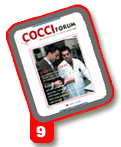COCCI Views
Blending nutrition into coccidiosis management - Stephen P. Collins Vice President, Worldwide Poultry Schering-Plough Animal Health Corporation.

Stephen P. Collins Vice President, Worldwide Poultry Schering-Plough Animal Health Corporation |
A few years ago, when we started
CocciForum magazine, we didn't
realize how quickly nutrition
would become part of our editorial
planning. This latest issue is a
good example of that trend.
On the cover, for instance,
you'll see a veterinarian and feed
mill worker in Spain examining a random sample of feed
before it's shipped to a broiler farm. And on page 6, you'll
find a new feature we're introducing called Nutrition
Notebook, where leading specialists in the field will share
their latest ideas for maximizing performance. In this issue,
even our Technically Speaking column "one normally
reserves for health topics "has a nutrition angle.
Why the heavy editorial emphasis on nutrition?
Two reasons.
First, our readers have been requesting it via
CocciForum reply cards or through direct communication
with the editor. They recognize that our magazine's focus is
coccidiosis, but they've also learned that nutrition can play
a big role in successful and profitable control programs.
They want to learn even more.
Second, over the years most mainstream poultry companies
have turned to vaccination for at least a part of their
coccidiosis-management program. In the US, for example,
seven of the top 10 broiler companies have taken this route.
Similar trends are being seen in other major poultry markets
in Latin America, Europe, Asia and the Middle East.
Initially, most of these companies switched to coccidiosis
vaccination to "break up the cycle" of traditional in-feed
anticoccidials, many of which were losing effectiveness after
continuous use. Others saw vaccination as a good way to
meet growing and regulatory demand to use fewer drugs in
animal feeds.
Today, poultry companies like AVILESA (page 2) are
experiencing even more benefits from coccidiosis vaccination.
For example, they've learned that it allows them to be
more flexible with their marketing. In addition, they've discovered
that feed programs can be more profitable if they
don't have to work around prescribed treatment regimens
and withdrawal times associated with traditional in-feed
anticoccidials. In other words, broiler feed programs can be
adjusted to meet the needs of the birds, not the requirements
of the drug.
Nutrition and poultry health specialists are also teaming
up to develop innovative programs such as IDEA, which
provides a roadmap for maximizing the performance and
profitability or broilers (see articles beginning on pages 6
and 17).
As the recognized leader in coccidiosis management and
an ally of the world poultry industry for nearly a century,
this publication's sponsor, Schering-Plough Animal Health,
feels an obligation to "surround" coccidiosis management
and bring you all sides of this rapidly evolving story. Nutrition is one good example. In future issues, we'll continue
to report on even more developments in technology
that will help you manage this costly, prevalent disease.
Our readers tell us they learn a lot from our magazine -
and for that we're grateful. We also learn a lot from our customers
and other experts in the industry. It is our privilege
to share their ideas with you in CocciForum.
Source: CocciForum Issue No.9, Schering-Plough Animal Health.







